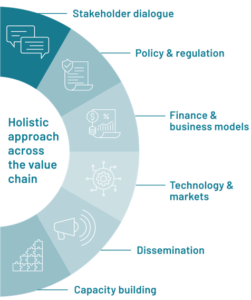Upscaling Sustainable Cooling
Description of the Project
With energy demand expected to increase 50% by 2040[1], MENA countries face a range of challenges in the face of climate change. The region’s energy challenges also include rapidly growing population, urbanisation, and heavily strained energy infrastructure. Cooling represents a major source of energy consumption in the region.
The use of cooling is expected to grow further since, with an improved standard of living, more households are using air conditioning (AC) systems that are often operated and inefficient. Furthermore, inevitable impact of climate change is expected in this vulnerable region with rising average temperatures by 2°C by 2050 coupled with increased humidity, need for intensive cooling. An additional climate impact from cooling comes from the refrigerants still used in many of present air conditioners and refrigerators. Such refrigerants with a high global warming potential are 2,000 times more potent for the climate (direct greenhouse gas emissions) than carbon dioxide and natural refrigerant alternatives.

There is high potential to improve energy efficiency and boost the utilisation of natural refrigerants in cooling and refrigeration in the partner countries. However, gaps in the regulatory framework, technical capacity, and financing models as well as the lack of direct cost-savings by use of natural refrigerants prevents actions from moving forward. Cool Up programme focuses on accelerating uptake of sustainable cooling in the partner countries.
As part of the programme interventions, Frankfurt School of Finance and Management is working on improving the understanding of sustainable cooling financing strategies by the financial sector, both public and private. Frankfurt School is engaging with various financial institutions to develop business cases and financing models that will boost the cooling transition using the selected sustainable technologies available in these countries. This engagement is expected to facilitate knowledge sharing and capacity building of the financial institutions as well.
[1] British Petroleum. BP Energy Outlook 2018; Report; British Petroleum: London, UK, 2018.